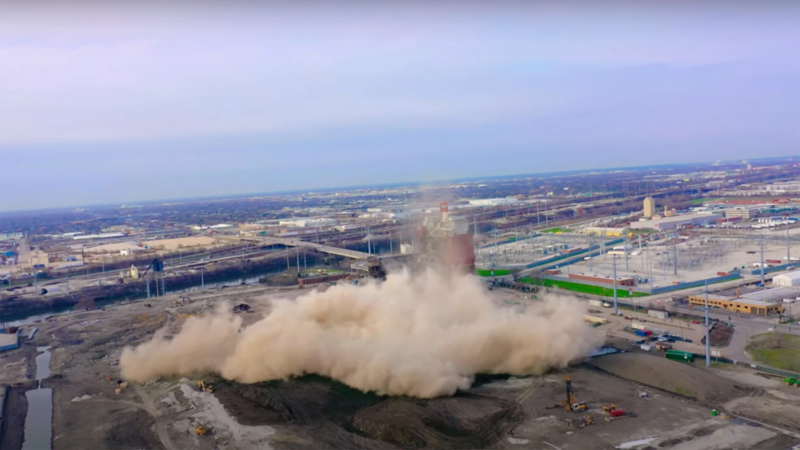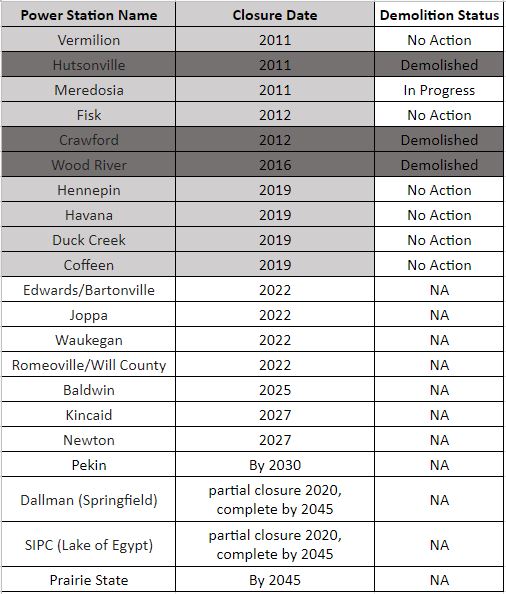
Over the last decade, half of Illinois’ coal-fired power plants have retired. Of those remaining, seven have near-term planned retirement dates, and the remaining are subject to emission reductions and retirement dates under the Climate and Equitable Jobs Act. However, few regulations exist to protect community members during the demolition of power plant facilities. These demolitions are subject only to asbestos regulations and local requirements that vary across municipalities, leaving Illinois communities at risk and unprepared to oversee these massive industrial explosions.
Prairie Rivers Network and state partners are advocating for the Power Plant Demolition Transparency and Protection Act that will provide state oversight, public engagement, and health protections surrounding the demolition of facilities associated with power plants.
Coal Plant Demolition in Little Village Sends Dust Cloud Over Community
After years of grassroots advocacy, Little Village Environmental Justice Organization (LVEJO) and partners, celebrated the closure of the Crawford Generating Station in Chicago in 2012. The community quickly set to work planning and envisioning how the plant parcel could be transformed to benefit the community. The future this environmental justice community envisioned has been met with many obstacles, including the botched demolition of the plant in 2020 (read also about plans to develop the site into a distribution center despite local opposition).
In April 2020, the Crawford plant smokestack was demolished, causing a massive cloud of dust to spread over the adjacent neighborhood of Little Village. Residents received a minimal warning and were sheltering in place because of the COVID-19 pandemic. The incident came as a result of documented failures of both the owner, HILCO, and Chicago City officials to adequately protect Little Village residents, and demonstrates the need for state action to protect communities.
Lack of Transparency Around Demolition at Wood River Coal Plant
In 2020, PRN worked with community members and organizations in the Metro East Area (Piasa Palisades Sierra Club, Metro East Green Alliance, and United Congregations of MetroEast) to call on CTI Development (a subsidiary of Commercial Liability Partners), to provide more transparency and a meaningful public dialogue around the demolition of the Wood River Coal Plant near Alton. Repeated attempts to engage with them were denied before the demolition of the power plant and smokestack in Spring 2021. A different subsidiary of the same company demolished a smokestack at a power plant in Ohio, dropping parts of the stack into the river.
The Power Plant Demolition Transparency & Protection Act
The time to establish state oversight, public engagement, and health protections around power plant demolitions is now. The Crawford and Wood River demolitions are among Illinois’ most recent demolitions. Decommissioning is underway at Meredosia and the shuttered power plant facilities remain standing at Canton, Coffeen, Fisk, Havana, Hennepin, and Vermilion. This year, the power plants in Joppa, Romeoville, Bartonville, and Waukegan will close.
Prairie Rivers Network has been working closely with the Illinois Sierra Club, Illinois Environmental Council, Little Village Environmental Justice Organization, United Congregations of Metro East, Metro East Green Alliance, other frontline organizations, and state legislators to develop legislation to protect power plant communities.
The Power Plant Demolition Transparency & Protection Act will provide the following:

- Expand public notice and participation requirements for power plant implosions:
- Public notice at least 60 days before the implosion
- Establish email, phone, and text lists for contact
- Newspapers within 25 miles, direct mail within 1 mile
- Notice in public places
- Public meeting at least 30 days before implosion
- Experts from the company must attend and answer questions
- Email/phone/text reminders sent a few days before the demolition and updated if the demolition plan changes
- Public website for demolition details, Air Quality Plan, etc.
- Public notice at least 60 days before the implosion
- Establish state oversight by requiring an Illinois EPA-approved Air Quality Plan including:
- Air quality modeling & monitoring
- Modeling predicts impacts and establishes monitoring locations, and identifies intolerable wind speeds and directions
- Monitoring tracks air quality before, during and after the implosion
- A Dust Mitigation Plan with control measures to prevent impact from dust
- A Contingency Plan in case the control measures fail
- A Site Cleanup Plan for removing demolition debris after the implosion
- Air quality modeling & monitoring
- Establish new fees for power plant demolitions in violation of these rules
- $50,000 for the first violation
- $250,000 for second or subsequent violations
We will keep our members updated as the bill moves through the legislative session and when there are opportunities to advocate for this important issue.







